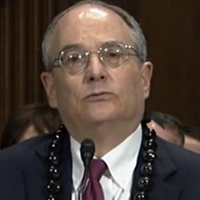
California Supreme Court Chief Justice Patricia Guerrero
SAN FRANCISCO - The California Supreme Court says a lower court was wrong to order a company to face a California jury trial in a shareholder lawsuit, despite contract language that should have forced the plaintiffs to sue in Delaware.
In the ruling, a unanimous state high court said the so-called forum selection clause in the contract was enforceable and could not be undone by California's expansive right to jury trials.
The underlying lawsuit involves several corporations: EpiRx sued EpicentRx — which conducts clinical trials for cancer treatments — along with controlling stockholder InterWest Partners and various individuals.
EpiRx, which said it invested $5 million in the company between 2016 and 2018, alleged financial misconduct that rendered EpicentRx unfit for an initial public offering and said it removed an EpiRx representative from the corporate board, refusing requests for operational and financial information.
Although EpiRx sought to have the trial proceed in San Diego County Superior Court, EpicentRx argued its incorporation certificate designated the Delaware Court of Chancery as “the sole and exclusive forum for any stockholder … to bring any derivative action or proceeding brought on behalf of the company,” among other language.
San Diego County Superior Court Judge Timothy Taylor said the forum selection clause violated California public policy because it functionally waived the right of California residents to a jury trial. The California Fourth District Appellate Court agreed on appeal, ruling that although forum selection clauses are valid in Delaware, California law should apply to whether such clauses are enforceable on California plaintiffs, and in this case EpiRx specifically demanded a jury trial.
Several defendants, including EpicentRx, asked the Supreme Court to review the matter. Chief Justice Patricia Guerrero wrote the opinion, filed July 21.
After reviewing the established preference for California residents to keep their legal matters in the state, the top court noted judges have discretion to weigh the validity and enforceability of forum selection clauses when all the parties freely entered such agreements.
“Even a California resident will normally be bound by a forum selection clause,” Guerrero wrote, pointing to the court’s 1976 opinion, Smith, Valentino & Smith v. Superior Court. And although the state’s courts can opt against enforcing such a clause if doing so would contravene other public policy, they don’t have “unbounded discretion to decline to enforce otherwise valid forum selection clauses.”
The court identified instances in which California lawmakers specifically prohibited forum selection clauses in contracts, such as in franchise agreements or consumer personal property lease deals.
“The Legislature has also enacted Labor Code section 925, which generally prohibits an employer from requiring an employee who primarily resides and works in California to agree to a forum selection clause that would require the employee ‘to adjudicate outside of California a claim arising in California,’” Guerrero wrote.
While the court agreed with EpiRx that “California public policy supports the right to trial by jury where applicable,” as guaranteed in the state constitution, it rejected the framing of a forum selection clause as a waiver of the right to jury trial. Guerrero explained the potential for the state to “become a magnet” for disputes where plaintiffs sought a civil jury trial, noting such arrangements “are highly atypical outside the United States.”
While "California has a strong public policy in favor of the right to a jury trial and against predispute waivers of that right," that policy does not negate other state's laws, she said.
"... California does not have a strong public policy against forum selection clauses or agreements to litigate in a jurisdiction that does not recognize the same civil jury trial right," Guerrero wrote.
Guerrero further wrote “the civil jury trial right is a procedural right, not a substantive one” and said the appellate panel erred by trying to balance a right to a jury with the validity of other contracts.
“We need not and do not consider whether California’s strong public policy in favor of the right to a jury trial might be relevant, in combination with other factors, to the enforceability of a forum selection clause in other contexts or under other theories,” Guerrero wrote. “Nothing in our opinion today detracts from our longstanding recognition that the right to a jury trial is a fundamental feature of the California forum.”
The complaint was remanded for further proceedings.
EpicentRx was represented by attorneys Todd A. Boock and Jill Ray Glennon, of the firm of Brown Neri Smith Khan; and David Davidson, Clint D. Robison and Angeli C. Aragon, of the firm of O’Hagan Meyer.
InterWest Partners was represented by attorneys Shannon E. Eagan, Angela Dunning and Rebecca Tarneja, of Cooley LLP.
EpiRx was represented by attorneys Walter J. Lack and Steven C. Shuman, of the firm of Engstrom Lipscomb & Lack.
The U.S. Chamber of Commerce filed a support brief on behalf of InterWest through Eimer Stahl.





